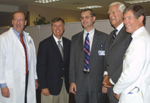Graham, Hollings support NCI quest
by
Jonathan MazeOf The Post and Courier Staff
The Medical University of South Carolina, pushing ahead in its bid to break into the upper tier of cancer treatment centers, has enlisted some powerful help to get there.
 A current and
former U.S. senator from South Carolina are among the staunch
supporters of the Hollings Cancer Center and its bid to obtain the
coveted status of NCI designation. From left to right are Dr. Andrew
Kraft, director of the Hollings Cancer Center; U.S. Sen. Lindsey
Graham; Dr. John Raymond, provost and vice president for academic
affairs; former U.S. Sen. Fritz Hollings and Dr. J.G. Reves, vice
president for medical affairs.
A current and
former U.S. senator from South Carolina are among the staunch
supporters of the Hollings Cancer Center and its bid to obtain the
coveted status of NCI designation. From left to right are Dr. Andrew
Kraft, director of the Hollings Cancer Center; U.S. Sen. Lindsey
Graham; Dr. John Raymond, provost and vice president for academic
affairs; former U.S. Sen. Fritz Hollings and Dr. J.G. Reves, vice
president for medical affairs.U.S. Sen. Lindsey Graham was at the Hollings Cancer Center on Monday, along with former Sen. Fritz Hollings, after whom the center is named, to lend support to the university’s effort to secure a National Cancer Institute designation for the center. The designation would put the university on the top level of U.S. hospitals that treat cancer.
Graham’s support includes an $8 million appropriation for the university that he got included in the federal budget now making its way through Congress. The funds would help pay for another MUSC research building viewed as an important piece of the infrastructure the university needs to win the designation.
“This designation is rare and it’s coveted,” Graham said. “It will give the Hollings Cancer Center a chance to play in the major leagues.”
Cancer is the second-leading cause of death in South Carolina, killing nearly 8,000 people a year. More than 17,000 new cases are diagnosed every year.
There are 54 National Cancer Institute-designated cancer centers around the country, including three in North Carolina. South Carolina doesn’t have any.
The university is eager to be the state’s first. Officials believe it would make the center more competitive for some research grants and help lure researchers.
Word that MUSC is working to secure the designation already has helped the university recruit some researchers, said Andrew Kraft, M.D., director of the cancer center. He was lured here himself to help the university land the designation.
MUSC is still a long way from achieving its goal. The university won’t be ready to apply for the label for another two years, Kraft said, and it will take another nine months beyond that point before the National Institutes of Health makes its decision.
The university has been working on the effort for years and is building labs and other space that officials believe will be necessary to win the cancer institute designation.
A new tower for the cancer center is expected to be finished in a month, after which the university will begin renovating existing center space for patient care.
Also, the university is designing a $45 million, 100,000-square-foot research building focused on developing new drugs, mostly for cancer. The building would house many disciplines, including oncologists, pharmacists, chemists and structural biologists.
The $8 million in proposed federal funds are earmarked for another building, a bioengineering center. At 120,000 square feet and costing an estimated $48 million, it would build on a current bioengineering collaboration uniting MUSC life scientists with engineers from Clemson. Much of the work in the building would focus on cancer.
Funds to build the center are coming from a variety of federal, private and state sources, including state lottery funds made available through the Life Sciences Act. John Raymond, M.D., MUSC’s provost, said the university has identified about 80 percent of the funds for the building.
Kraft said work done in the building will focus on genetics and control, finding out who is at risk of getting cancer and finding treatments to prevent the disease.
“This is not just some esoteric research,” Kraft said. “This will give us a chance to bring things, like agents and procedures, that patients need, so they don’t have to go elsewhere.”
Editor’s note: The article ran July 26 in the Post and Courier and is reprinted with permission.
Friday, July 29, 2005
Catalyst Online is published weekly,
updated
as needed and improved from time to time by the MUSC Office of Public
Relations
for the faculty, employees and students of the Medical University of
South
Carolina. Catalyst Online editor, Kim Draughn, can be reached at
792-4107
or by email, catalyst@musc.edu. Editorial copy can be submitted to
Catalyst
Online and to The Catalyst in print by fax, 792-6723, or by email to
petersnd@musc.edu
or catalyst@musc.edu. To place an ad in The Catalyst hardcopy, call
Community
Press at 849-1778.